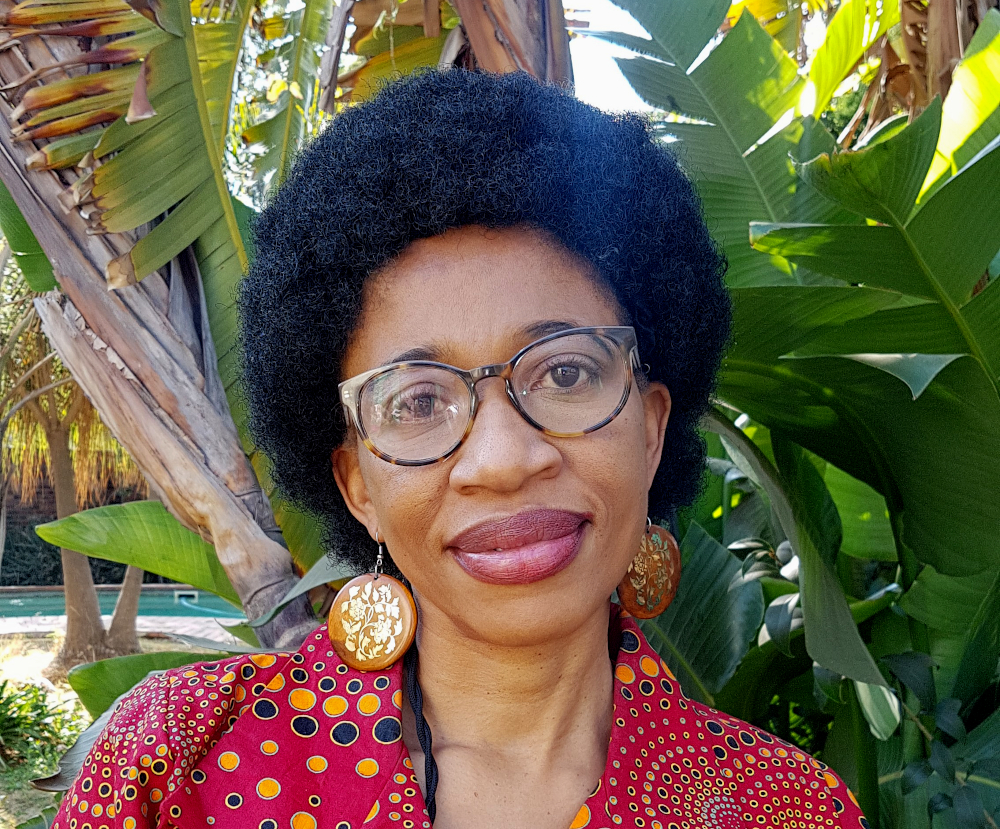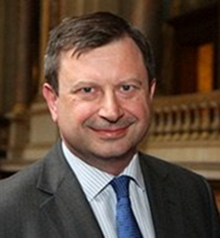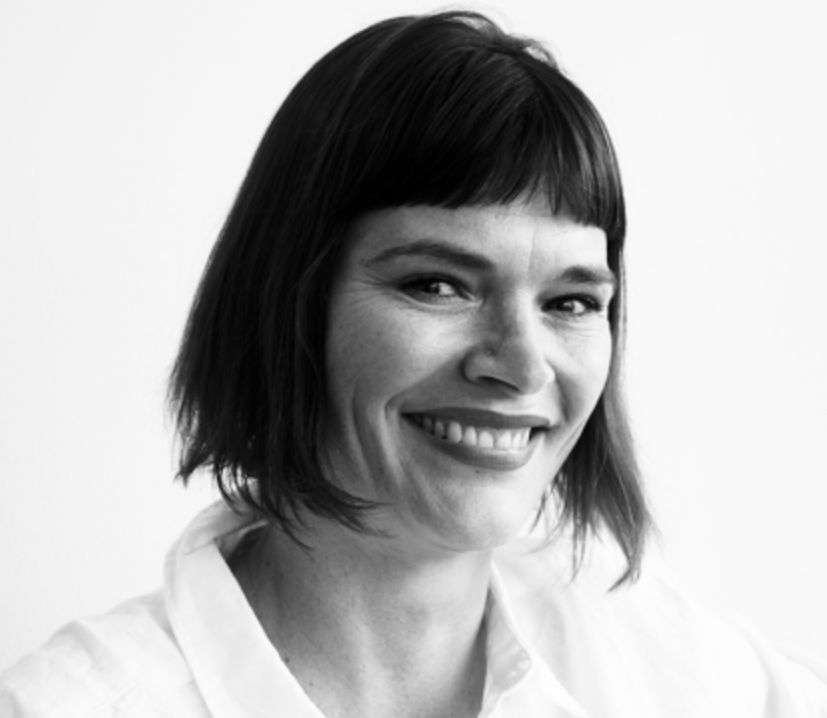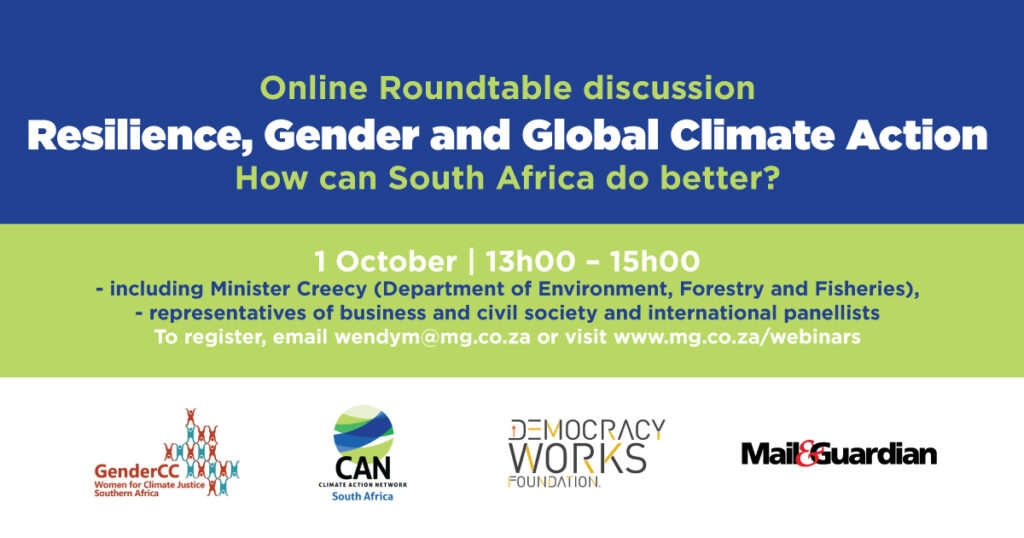Barbara Creecy, Minister of Forestry, Fisheries and the Environment. (Photo by Ruvan Boshoff)
This Mail & Guardian webinar was sponsored by GenderCC Southern Africa. It featured Barbara Creecy, Minister of Forestry and Fisheries and Environmental Affairs; Emilia Reyes, Programme Director of Policies and Budgets for Equality and Sustainable Development at Gender Equity: Citizenship, Work and Family, and Co-convenor of the Women’s Working Group on Financing for Development (Mexico); Paul Arkwright, Regional Ambassador for the UK in sub-Saharan Africa and the UK COP26 Africa Envoy; and Bertha Chiroro, Project Co-ordinator for GenderCC Southern Africa. It was moderated by Mira Dutschke, Manager of the South African Programme of the Democracy Works Foundation.
Women are disproportionately affected by climate change, just as they were and are affected by the Covid-19 pandemic. As such, they must be at the centre of any decisions made regarding how South Africa and the world addresses the crisis of global warming — and this is one of the specific aims of COP26.
The webinar was introduced by Bertha Chiroro, who outlined how GenderCC integrates climate change policy, research and actions with issues of gender equality.
 Bertha Chiroro is a project co-ordinator for GenderCC Southern Africa
Bertha Chiroro is a project co-ordinator for GenderCC Southern AfricaMira Dutschke spoke briefly on the Democracy Works Foundation, then provided a brief background on Paul Arkwright. He spoke about the postponed COP26 (the annual UN climate conference or “conference of parties” was due to be held in Glasgow in November), and the fifth anniversary of the Paris COP talks, which will take place on December 12. China has committed to zero carbon emissions by 2060, “a very important step”; South Africa has set out a low energy development strategy, and has “aspirations” for zero emissions by 2050, he said.
COP26 aims to be the most inclusive of all the COP talks so far: there will be platforms for women, youth, indigenous groups and people with disabilities, and they will be able to engage with leaders. The focus will be on adaptation and resilience; the transition to clean energy; access to finance; and nature-based solutions. Arkwright said that gender affects every one of those campaigns.
He said that the UK government is championing women’s roles as climate leaders, amplifying their voices, and working on their empowerment in education. It is focusing on violence against women and girls, which increased in the pandemic. It is working out what the needs of women are and how to fulfil them, and addressing the gaps in financing that women experience.
Chiroro noted that SA has been a full signatory since 1996 to the United Nations Framework Convention on Climate Change and highlighted policy milestones including adoption of the National Climate Change Response White Paper in 2011.
In 2019 the Carbon Tax Act was passed, which provides for a gradual phase-in with a very low base rate and a review after three years. Also, the National Planning Commission issued the concluding report of its project of stakeholder engagement, exploring Pathways for a Just Transition to a low-carbon economy and society, including the proposal of a “Vision 2050”, looking to a zero carbon economy. Recently a somewhat revised version of the Climate Change Bill was tabled at the National Economic Development and Labour Affairs Council, which may recommend further amendment or elaboration when the Bill goes to Parliament, hopefully before the end of the year.
 Paul Arkwright is a regional ambassador for the UK in Sub-Saharan Africa and the COP26 Africa envoy
Paul Arkwright is a regional ambassador for the UK in Sub-Saharan Africa and the COP26 Africa envoyCabinet recently adopted the National Adaptation Strategy and approved South Africa’s Low Emissions Development Strategy to 2050 for submission to the UNFCCC Secretariat; this reflects policies and measures already formally adopted by government and is described as a living document, to be revised on a regular basis; it mentions working towards an eventual goal of net zero carbon, but the benchmark remains the PPD (peak, plateau and decline) emissions range. In June this year Creecy announced that the timeframe for the revision of our nationally determined contribution to 2030 would be extended in line with the postponement of COP26 to November next year, thus allowing for a more rigorous process of analysis and consultation.
Barbara Creecy said that many have commented on how the Covid-19 pandemic can serve as a dress rehearsal for future climate-related events, and how countries will respond to these events. These crises will disproportionately affect the poor and vulnerable countries. The pandemic also affected the genders in different ways; women have been hit the hardest, as they are in the most vulnerable employment positions.
A study in KwaZulu-Natal examined how gender dynamics are affected by climate change. It revealed how, even without climate change, there are too many burdens placed on women, such as childcare and collecting water; and as conditions become drier, these tasks will become even harder. Gender issues, such as access to land, will become exacerbated. “We have to understand the specifics and value chains of how climate change will affect women living in poverty in rural areas, to bring about a just transition in which no-one is left behind,” said the minister.
How can we use the lessons learned from the pandemic, asked Creecy? There were two significant learnings. The first was that the virus is zoonotic (transmitted between animals and people) and arose as a consequence of the boundaries between humans and nature being over-ridden. We are going to have to confront the issues that arise from environmental degradation and biodiversity loss. Secondly, we learned that when all its different departments work in collaboration, government is able to achieve a great deal, very quickly.
The African Green Stimulus Programme is being formulated to revitalise a number of sectors such as eco-tourism and other nature-based economies. Sustainability is the way forward to open up new industries such as circular waste disposal, green energy, and programmes that rehabilitate eco-system services. “Climate change should not be seen solely as a threat to existing jobs and industries; it is something that also contains huge potential, and investment in new technologies is thus essential.”
Last month government approved the Climate Change Adaptation Strategy, which will help to ensure that all levels of government prepare for the forthcoming climate change. Inherent in this strategy is a gender component — the government understands that women are especially vulnerable — and women must be more involved in decision making. Cabinet has approved the formation of the Presidential Climate Change Co-ordinating Committee, an important step, as it represents all social partners, and it will ensure that nobody is left behind.
The South African government is committed to the United Nations Framework Convention on Climate Change goals regarding the environment and lowering emissions, and is mobilising the technology and investment needed to do so. Multi-national co-ordination and co-operation is essential in this regard, and international financing is key for developing countries; the government is very grateful to those countries that have contributed to our recovery from Covid-19.
“The intersection between gender and climate change is complex, but it cannot be swept under the carpet if we are to ensure that all our citizens are properly equipped to deal with the issues that face us. Co-operation in this regard is key, and I do believe that we have the tools at our disposal to modify and synergise our responses to climate change,” said Creecy.
 Emilia Reyes, Women’s Working Group on Financing for Development (Mexico)
Emilia Reyes, Women’s Working Group on Financing for Development (Mexico)Emilia Reyes said her organisation in Mexico is working out how to put gender and climate change issues together. She said the disparities between the global north and south regarding labour have to be taken into account, and the flaws in the current neoliberal and capitalist system, so that all countries can deal with the challenges of climate change equally and effectively. The money flows are drastically unequal: for every dollar sent from the north to the south, $80 flows from the south to the north.
Africa is a net creditor to the global north, and illicit financial flows such as tax evasion deprive developing countries of resources to adapt to climate change; global taxation governance must also be taken into account.
Reyes said there is a call for restructuring the global economy so that all nations can deal effectively with the global economic recession and climate change, as developing countries cannot mobilise enough resources to deal with the challenges on the ground. Trillions of dollars are still being spent on extracting fossil fuels, and unless this is regulated it will continue to undermine any efforts to meaningfully address climate change.
 Lebogang Mulaisi of COSATU
Lebogang Mulaisi of COSATUAs women have been confined during the lockdown they have been placed under more pressure to maintain households and children, and this has set their struggle for emancipation back a couple of decades, said Reyes. Women do the majority of unpaid-for care work; this unfair sub-division of labour must be put at the centre of a decolonial and just transition. As jobs change in the green economy we must be careful not to replicate gender inequality again, she warned.
Three more panellists made contributions: Lebogang Mulaisi of Congress of South African Trade Unions; Reitumetse Molotsoane from the National Business Initiative; and Sonia Phalatse of the Institute for Economic Justice.
Phalatse presented key findings of the Just Recovery Report, commissioned by 350Africa, which indicates that no just transition is possible unless we are able to structurally transform our economy; incremental reform is not enough. In the same way that we have exploited the environment, we have exploited women in care work. The Green Economy must be complemented by the Purple Economy, recognising value chains in unpaid work, and cultural aspects that were insufficiently identified in the past.
 Sonia Phalatse of the Institute for Economic Justice
Sonia Phalatse of the Institute for Economic JusticeThe Just Transition is not just a popular phrase: we need to deal with economic and environmental injustices together, as an important way to restructure our economy post the pandemic. Renewable energy is a way to create jobs, especially for women.
Pheladi Tlhatlha delivered a statement on behalf of the South African Climate Action Network, noting that since the UN’s COP25 climate talks governments are not addressing the climate emergency. The pandemic showed that governments can act, but they choose not to. Major emitters must demonstrate how they plan to reduce emissions, and governments must commit to meaningful action that addresses climate change.
Questions
 Mira Dutschke is the manager of the South African Programme of the Democracy Works Foundation
Mira Dutschke is the manager of the South African Programme of the Democracy Works FoundationArkwright said that the UK government is focusing on hydrogen-based green fuels and exploring “debt swaps” as an opportunity to increase climate finance.
Creecy said that the big question is, who is going to pay for the damage that is going to happen as a result of the extreme climate events that are going to occur? The developing countries will be bearing a disproportionate burden: for example, Beira was wiped out and the people of Mozambique are now paying to restore it, even though the developed world was responsible for the emissions that drive extreme climate events like the cyclone. Creecy said that developing countries don’t want charity, they want predictable means of financing their recovery plans — an issue not resolved at COP25.
To listen to Minister Barbara Creecy’s Resilience, Gender and Global Climate Action Round Table speech, made on October 1, visit: https://www.gov.za/speeches/minister-barbara-creecy%E2%80%99-1-oct-2020-0000
Statement by the South African Climate Action Network (SACAN)
On December 15 2019, the UN’s COP25 climate talks concluded with governments showing no signs of addressing the climate emergency. In fact, as civil society, we were disheartened by the events that followed, but we are more shocked by the recent events and reactions to the global pandemic.
Governments have not acted adequately when it comes to the climate crisis but acted with swift determination when it comes to Covid-19. This made us understand that governments can act but choose not to. And this is why it is important for us today to remind you that we said we will not rest until governments and corporations begin to take the climate crisis seriously.
The gap between what people need for a climate-safe future and what our leaders are willing to do is widening as emissions rise, fossil fuel production expands and impacts escalate. Major corporate emitters must show how they plan to increase ambition and governments overcome their reluctant to regulate and to ensure compliance with with ambitious national action.
 Pheladi Tlhatlha delivered a statement on behalf of the South African Climate Action Network
Pheladi Tlhatlha delivered a statement on behalf of the South African Climate Action NetworkRich countries must honour their promise to provide additional and sufficient finance for mitigation, adaptation and loss and damage. It falls upon those that are most vulnerable to protect themselves, particularly women who are primary caretakers and bear the cost of unpaid labour at a time of crisis such as this pandemic. As SACAN, we believe that to protect South Africa from the worst impacts of climate change and to make a real contribution to addressing the climate crisis, the following must be prioritised:
● South Africa’s economy-wide emissions must peak before 2030 – not by 2035 as envisioned in the PPD emissions Range in prevailing policy. Our domestic mitigation system must align to 1.5 degrees Celsius and achieve a thought-through contribution to achieving the global temperature goal.
● The Development Bank of Southern Africa (DBSA) must align its lending with the reality of climate change and stop funding new fossil fuel projects
● Our government must commit to tabling the Climate Change Bill in 2020 and also publish details of the process for the revision of our Nationally Determined Contribution (NDC), to conclude well ahead of COP26.
With no agreement on carbon market rules, SACAN reiterates that any rules decided next year must secure environmental integrity and the protection of human rights. Anything less than this is unacceptable.
Last week, thousands of climate activists and youth strikers engaged in a peaceful but loud action worldwide in the midst of a global pandemic, with a common message:
Take the crisis seriously and act like you are taking it seriously. We now enter a “decade of ambition” that must see transformative policies to limit global temperature rise to 1.5 degrees Celsius. Governments cannot ignore the will of the people, especially the youth. On the way to COP26 in November 2021, in Glasgow, we need to see updated and science-based climate targets from all nations.
To view the webinar, visit: https://event.webinarjam.com/replay/413/wyw94szlb5ohzkum9k0
